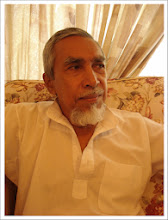1. A newspaper report
in the Straits Times, 19 August 1948, on page 7 carried the headline “Mukim
Councils to Aid Defense, Urge.” The first paragraph read:
"A Malay Unofficial Member, Mr. M. I. Merican, urged today the appointment of Mukim Councils to aid in Kedah’s defence organization during the “present emergency.”
2. An incident in June 1948 triggered the
“emergency” when three European plantation managers were
killed in
Perak. In response to the
incident, the British brought emergency measures into law, banning the Malayan
Communist Party (MCP) and other leftist parties. Consequently the military arm of the MCP began a
guerrilla campaign which marked the beginning of an armed insurgency.
3. In the news quoted above, the paper was
reporting on an adjournment speech
delivered by M. I. Merican at the meeting of the Council of State held on 18th
August, 1948. He was appointed an unofficial member of Kedah State Council and
Council of State on 1st February 1948 and served until 1955.
4. In his speech, he
told the Kedah State Council that the setting up of Mukim* Council “would
require legislation to empower such Council to carry on its functions and
duties.” He stated that “the Council would appoint its own Chairman and members,”
pointing out that “all the natives of the Mukim would be eligible for
membership of the Mukim Council irrespective of race, religion and creed, which
would foster inter-communal amity.”
5. With regard to
defence he stated that “the Council would create and form kampong volunteers
for the safeguarding of the Kampong.” He pointed out that “there could be night
patrols of Kampong Volunteers who could arrest undesirable persons and hand
them over to the Police.”
6. At that time talk
of self-government was the order of the day. In his speech, M. I. Merican cited
that “His Highness the Sultan declares in the Laws of the Constitution of the
State that election will be introduced in due course.” He pointed out that election
“would be the beginning of self-government whenever it should happen.” He
reasoned that “The Mukim Council when and if in existence would be a good
training ground for the principles of the election as a step forward to local
self-government.”
7. His view of the
Mukim Council as “a step forward to local self-government.” is clearly defined
in the following statement:
“Now all the functions and duties of the Mukim Council aim at their realisation of local self-government. This self-government is a small pattern of democracy which is the ultimate objective of the declaration of His Highness the Sultan to introduce election in due course. By training themselves in the principles of local self-government the inhabitants of each Mukim will unconsciously prepare themselves for the eventuality that will emerge to confer self-government on the peoples of the Federation of Malaya.”
8. Further, M. I.
Merican pointed out that the benefits that would accrue to the Mukim would be
great in relation to economic and industrial matters. He stated that “The Mukim
Council would have a wide scope of work affecting beneficially the welfare of
the inhabitants of the Mukim” which would include pasturage, sanitation and
health, co-operative padi planting and other industrial pursuits.
9. Regarding pasturage, he stated that “the Council could apply for
State Land to serve as grazing grounds for their cattle.” He said that the
grazing grounds “would eliminate prosecutions for animal trespass on bendang
land – a common type of offence in the Mukim.”
10. With regard to sanitation and health, he stated that “the Council
would be able to call on the kampong people to clear away the dirt and keep
their kampong clean and to see to the instituting of safeguards against the
pollution of wells and streams which form the source of their water supply.” He
also pointed out that “drainage on a small scale could be taken in hand to
clear away stagnant water and thus abolish breeding places for mosquitoes.”
11. Further, he stated
that “the Council would encourage co-operative activities in padi-planting and
other industrial pursuits such as weekly fairs and the production of other food
crops.”
12. In conclusion, he
stated that “the Department of Public Relations which has done so much good to
the inhabitants of the rural areas in interpreting Government policy and
imparting useful information,” could play an important role in assisting “the
Mukim Councils as the medium of their exchange of ideas for the good of the
country as a whole.”
*Several “mukims” make
up a district called “daerah.”
bendang = paddy field
padi = rice
 |
| Group photograph of members of the Council of State during the second meeting of the Council on 11th April 1948. [Enlarged image: M. I. Merican] |











No comments:
Post a Comment